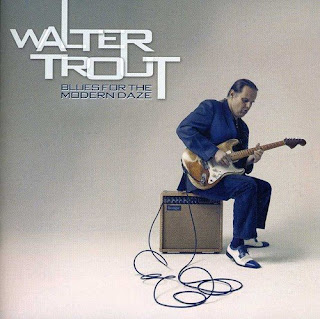A few years back, however, Trout began a transformation, subtle at first, but picking up steam through albums like 2008’s The Outsider and the 2009 compilation Unspoiled By Progress, featuring the new track “They Call Us the Working Class.” With the release of his 21st album, Blues For the Modern Daze, Trout’s evolution seems complete – the singer, songwriter, and guitarist is now the populist voice of the blues, following in the footsteps of artists like Big Bill Broonzy, J.B. Lenoir, and Blind Willie Johnson, whose influence on these songs Trout has frequently cited.
Walter Trout’s Blues For the Modern Daze
Blues For the Modern Daze opens with the scorching “Saw My Mama
Cryin,” a high-flying bit of bluesy social commentary that provides anguished
insight into the working class struggle. Trout’s tortured vocals convey
heartfelt emotion while his guitar weeps and moans and screams with some
intensity. Trout’s solos here cut deep as the band delivers a solid groove,
and the song rocks and rolls itself to an inevitable conclusion. By contrast,
“Lonely” is no less powerful a performance, the mid-tempo ballad-like rocker
featuring a nuanced vocal turn and mournful guitar licks. Although it’s a fine
showcase for Trout’s exemplary six-string skills, it’s also a solid example of
his songwriting chops and underrated, potent vocals.
The
doom-and-gloomish “The Sky Is Fallin’ Down” is a cautionary tale with a
bonfire soundtrack that nearly rages out of control as Trout levels
accusations and proffers his advice in the face of impending disaster, his
dark lyrics matched by incendiary fretwork that threatens to ignite your
speakers with its red-hot riffs, notes sparking from the fretboard. Trout’s
“Blues For My Baby” is a more traditionally-styled tune, with gorgeous piano
tinkling behind the guitarist’s smoky string-pulling. Close your eyes while
listening to this one and you could easily believe that you’re sitting in a
West Side Chicago club circa 1964 or so listening to Magic Sam or Otis Rush
wail on the blues.
Lifestyle of the Rich and Famous
For old-school classic rock fans, “Recovery” is a real find, Trout
channeling his inner Robin Trower with a phenomenal six-string performance
that matches Trower’s swirling, Jimi Hendrix-inspired psychedelic-blues sound
with a 1970s-styled, openly atmospheric blues-rock sound. A tale of romantic
woe, “Recovery” literally wears its heart on its sleeve, the song drenched in
the pathos of Trout’s effective, emotional vocals and imaginative fretwork.
“Turn Off Your TV” is both insightful and humorous, Trout delivering a
rollicking vocal performance above a slight boogie refrain, his lyrics
pointing to the hypocrisy of commercialization and the overall absurdity of
much of what one witnesses on the tube. Trout’s guitarwork here is more upbeat
and less provocative, delivered with energy and vigor while his hoarse vocals
reinforce the song’s themes.
Trout continues in his populist vein
with “Lifestyle of the Rich and Famous,” a slow-burning blues tune with
deliberately-paced guitar riffs and the constant joyful din of rolling piano
notes on this reverse “rags-to-riches” tale that cautions the wealthy1% that
life isn’t always a bowl of cherries, and that what goes up may one day come
back down to earth. Trout’s solos on the song are stunning, rich with tone and
sharp-edged, infused with the spirit of the blues while still rocking
hard.
Pray For Rain
The odd, albeit poetic spoken word piece “Puppet Master” offers Trout’s
somber vocals hauntingly applied above an evil keyboard riff, the brief
interlude leading into the rampaging “Money Rules the World,” a spot-on
lyrical condemnation of the effect of unbridled wealth and corporate
interference on the fate of the average person. A virtual theme song for the
“Occupy” movement, Trout layers on the blues with delightfully-tortured
guitarplay which frantically fire-dances above the song’s locomotive rhythms.
It’s a 21st century rocker worthy of Hendrix but offering a contemporary blues
edge. “Brother’s Keeper” is in a similar vein, a mid-tempo rocker with a
gospel frame of mind that calls out the self-righteous in no uncertain terms,
Trout’s flamethrower guitar solos throwing fuel on an already out-of-control
blaze.
The title track of Blues For the Modern Daze displays
the Blind Willie Johnson influence that Trout mentions in talking about the
album; the song an effective bit of intelligent social commentary delivered
with an undeniable Delta blues vibe and gospel fervor. Trout’s acoustic guitar
strum gives way to squalls of cyclone-strength electric riffs, the singer
shouting and screaming above an apocalyptic tango that reminds of Charley
Patton’s “High Water Everywhere” with its doomsaying lyrics and powerful
instrumentation. The album ends with “Pray For Rain,” a comparatively gentle
performance delivered in an acoustic country-blues style that is no less
effective for its seemingly innocent nature. Beneath Trout’s spirited
guitarplay and wailing vocals, however, you’ll real concern and some
metaphorical hard questions without easy answers.
The Reverend’s Bottom Line
In the spring of 2012, a lot of words have been spilled out in print and
online talking about Bruce Springsteen’s Wrecking Ball and the album’s
frequently vague political and social commentary. While I’m not going to diss
on the Boss, I’d argue that another New Jersey native has delivered the
essential protest album of the year.
Walter Trout’s
Blues For the Modern Daze is smart, insightful, and 99% to its core,
displaying an undeniable populist viewpoint while retaining the guitarist’s
trademark turbocharged blues-rock sound. As a songwriter, Trout has never been
better, and his voicing of his social concerns – bolstered by an unbridled
six-string rage – is delivered with plenty of heart and soul. This is Walter
Trout at his very best, and we should all be listening… (Provogue Records,
released April 24th, 2012)
Buy the CD from Amazon:
Walter Trout’s Blues For the Modern Daze


No comments:
Post a Comment
Note: Only a member of this blog may post a comment.